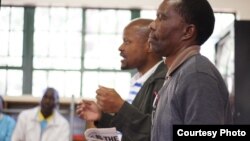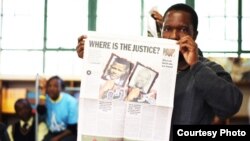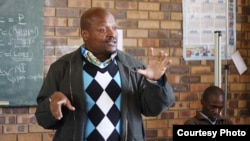JOHANNESBURG —
Fusi Mofokeng and Tshokolo Mokoena spent 19 years in South African prison for a crime both swear they did not commit, and for which legal experts say there is little compelling evidence.
Despite being out of prison now, the two men say they still are not free, more than two decades after a judge told them they would “rot in jail” for allegedly plotting a crime that ended with the death of one policeman and left another paralyzed.
The soft-spoken friends say they watched with heavy hearts as others who confessed to the crime were pardoned and had their names cleared as part of South Africa’s post-apartheid Truth and Reconciliation Commission.
The two have steadfastly maintained their innocence - something that didn’t allow them to participate in the commission, in which thousands of South Africans admitted to crimes and were given amnesty.
They were only paroled in 2011, after a legal battle, and say now they are on a mission to have their records cleared.
Their story is a long one, and legal experts say it may not be an isolated case of miscarried justice during South Africa’s turbulent apartheid era.
Imprisoned amid claims of innocence
The year was 1992, and South Africa’s apartheid system was in its death throes. Mofokeng and Mokoena were best friends in Bethlehem, a small town in the crosshairs of several political groups, including the once-banned African National Congress.
On April 2 of that year, a van carrying ANC members was stopped by police. Several men in the van opened fire, killing one policeman and paralyzing another. One of the men in the van was Mofokeng’s brother-in-law, and the two had seen each other the day before.
That, said Mofokeng, was enough of a link to convince police to arrest him for plotting with his brother-in-law -- and then to arrest Mokoena, who had visited Mofokeng that day.
Based on the testimony of one witness, the two were convicted to life in prison for conspiring in a plot that led to the policeman’s death. They were convicted of murder, conspiracy and attempted murder.
At the time, they said, the other suspects protested and said Mofokeng and Mokoena were not involved. Mofokeng said the one witness who spoke against them later visited him in prison and apologized, saying he was threatened by police and forced to testify.
The judge was unstinting, however, and Mokoena said he told them they would “rot in jail” for the rest of their lives.
Mofokeng was 25; Mokoena was 30 and had a wife and young daughter. His wife later divorced him, saying she couldn’t continue to be married to “a man with no future.”
“I agreed,” he said, and gave her permission for the divorce.
Mofokeng said he couldn’t believe what was happening.
“It was very difficult to accept that I’m in prison for life… for a crime I did not commit,” he said. “It was very difficult to accept the sentence itself. I think it took me more than seven years to accept that I’m in prison. And that led to me to fall under depression. I was severely depressed.”
The men continued to protest their conviction and maintain their innocence. Both said that at no point in their nearly two-decade prison term did they ever question their innocence.
They were finally freed in 2011 after a legal effort led by the Wits Justice Project, an investigative journalism project at the University of the Witwatersrand. Ruth Hopkins, who works with the project, said those who investigated their case were wholly convinced.
“I think they’re completely innocent,” she said. “I believe them, when they say they didn’t commit that crime, and they were just at the wrong time at the wrong place.”
She said it’s hard to know how many similar cases there are in South Africa, but that the Wits Justice Project gets many letters from prisoners who say they were wrongly convicted under the unfair apartheid system.
Released into a new South Africa
Mofokeng and Mokoena walked out of prison on April 2, 2011, exactly 19 years after that fateful day.
It was a surreal homecoming. The two men, who are black, were trapped in a veritable time capsule during one of South Africa’s most turbulent periods in history.
They heard about the 1994 election that saw South Africa get its first black president, Nelson Mandela. They heard about black men and women gaining wealth, status and equality.
But in prison, those advances didn’t matter. Color lines remained firm there.
“We were going through a very difficult stage, as the prison warders themselves were divided, the whites and the blacks,” Mofokeng said. “So they used to take their anger [out] on prisoners, assaulting them on a daily basis for minor things. Nobody was really paying attention to prisoners inside prisons in South Africa. The conditions in prison were unbearable, really. The situation was the same, whether we are now in democracy or still in apartheid. It took years for change to come inside prisons.”
When they emerged, it also took a while to absorb how much the world had changed. Mokoena had to ask a young relative to show him how to use his mobile phone. And when Mofokeng was invited to an event at a fancy Johannesburg hotel, he could not believe his eyes.
“Mingling with whites there, sitting around one table was a bit difficult for us,” he said. ”Because we are not used to sit[ting] with white people at one table. In the apartheid years we were not allowed to sit together with whites in one place. So it was very difficult. Yes, we are aware that changes took place, but practically it was very difficult."
“I always thought that somebody would come and move us,” he said with a laugh.
But even now, they say, they’re not truly free - they’re convicted felons on parole.
The men asked to meet in a mall in southern Johannesburg. To get there, they had to notify the local police they were leaving their small town of Bethlehem. They had to report to police when they arrived in Johannesburg. If they don’t obey these rules, they face arrest.
It’s awfully reminiscent, Mokoena says, of the apartheid-era “pass laws” that restricted non-whites from traveling freely.
“No, I am not free,” he said. “Because I am still under the door of correctional services, because anything I do, they must know. They come to my house, to sign, I must after two months go to their office.... I’m not free.”
Around them, men and women of all colors patronize the mall. We three sit together at a restaurant and eat the exact same meal: chicken with vegetables and rice. Even that, people of different colors eating the same food, was unheard of during their early prison years, where black inmates got inferior rations.
Looking back and ahead
At a nearby table sits Mofokeng’s brother-in-law, who was pardoned in 2000 and released. He now has no criminal record.
He's one of thousands of South Africans who participated in the post-apartheid Truth and Reconciliation Commission and sought amnesty for crimes they admitted to. Mofokeng and Mokoena said they couldn't participate in that process, because they refused to admit to a crime. Instead, they have applied to have their records cleared and are seeking reparations for their imprisonment.
Both men say they feel no anger toward their nation, the courts or even the wardens who mistreated them.
“I’ve realized that to harbor anger within me is going to destroy me,” said Mofokeng, who used his time in prison to get a degree in adult education. "I need to accept that that thing happened to my life, and find a way of dealing with that and accept so I can be able to move forward with my life. Without doing that, I was going to die. I was going to kill myself by not accepting that bad thing happened.”
But one emotion he allows himself is a measure of regret. He regrets, for example, that he has never had children. He regrets that he has had to wait two decades to marry the woman he loved as a young man. He regrets that he works a low-paying job and doesn’t have a pension or any savings. And he regrets that his brothers and parents died while he was in prison, and that his old friends largely moved on.
“I think I would have been very far by now, with life," he said. "As I compare myself with my friends, those who used to be very close to me, they are very far with life. They have a lot of things that I don’t have today. I think I could have achieved a lot of things in life, if given a chance.”
He said has no regret, however, about standing by his innocence.
“You cannot mix lies with the truth. The truth will always come on top," he said. "I always thought at the end of the day, we’ll be free. And it happened.”
Despite being out of prison now, the two men say they still are not free, more than two decades after a judge told them they would “rot in jail” for allegedly plotting a crime that ended with the death of one policeman and left another paralyzed.
The soft-spoken friends say they watched with heavy hearts as others who confessed to the crime were pardoned and had their names cleared as part of South Africa’s post-apartheid Truth and Reconciliation Commission.
The two have steadfastly maintained their innocence - something that didn’t allow them to participate in the commission, in which thousands of South Africans admitted to crimes and were given amnesty.
They were only paroled in 2011, after a legal battle, and say now they are on a mission to have their records cleared.
Their story is a long one, and legal experts say it may not be an isolated case of miscarried justice during South Africa’s turbulent apartheid era.
Imprisoned amid claims of innocence
The year was 1992, and South Africa’s apartheid system was in its death throes. Mofokeng and Mokoena were best friends in Bethlehem, a small town in the crosshairs of several political groups, including the once-banned African National Congress.
On April 2 of that year, a van carrying ANC members was stopped by police. Several men in the van opened fire, killing one policeman and paralyzing another. One of the men in the van was Mofokeng’s brother-in-law, and the two had seen each other the day before.
That, said Mofokeng, was enough of a link to convince police to arrest him for plotting with his brother-in-law -- and then to arrest Mokoena, who had visited Mofokeng that day.
Based on the testimony of one witness, the two were convicted to life in prison for conspiring in a plot that led to the policeman’s death. They were convicted of murder, conspiracy and attempted murder.
At the time, they said, the other suspects protested and said Mofokeng and Mokoena were not involved. Mofokeng said the one witness who spoke against them later visited him in prison and apologized, saying he was threatened by police and forced to testify.
The judge was unstinting, however, and Mokoena said he told them they would “rot in jail” for the rest of their lives.
Mofokeng was 25; Mokoena was 30 and had a wife and young daughter. His wife later divorced him, saying she couldn’t continue to be married to “a man with no future.”
“I agreed,” he said, and gave her permission for the divorce.
Mofokeng said he couldn’t believe what was happening.
“It was very difficult to accept that I’m in prison for life… for a crime I did not commit,” he said. “It was very difficult to accept the sentence itself. I think it took me more than seven years to accept that I’m in prison. And that led to me to fall under depression. I was severely depressed.”
The men continued to protest their conviction and maintain their innocence. Both said that at no point in their nearly two-decade prison term did they ever question their innocence.
They were finally freed in 2011 after a legal effort led by the Wits Justice Project, an investigative journalism project at the University of the Witwatersrand. Ruth Hopkins, who works with the project, said those who investigated their case were wholly convinced.
“I think they’re completely innocent,” she said. “I believe them, when they say they didn’t commit that crime, and they were just at the wrong time at the wrong place.”
She said it’s hard to know how many similar cases there are in South Africa, but that the Wits Justice Project gets many letters from prisoners who say they were wrongly convicted under the unfair apartheid system.
Released into a new South Africa
Mofokeng and Mokoena walked out of prison on April 2, 2011, exactly 19 years after that fateful day.
It was a surreal homecoming. The two men, who are black, were trapped in a veritable time capsule during one of South Africa’s most turbulent periods in history.
They heard about the 1994 election that saw South Africa get its first black president, Nelson Mandela. They heard about black men and women gaining wealth, status and equality.
But in prison, those advances didn’t matter. Color lines remained firm there.
“We were going through a very difficult stage, as the prison warders themselves were divided, the whites and the blacks,” Mofokeng said. “So they used to take their anger [out] on prisoners, assaulting them on a daily basis for minor things. Nobody was really paying attention to prisoners inside prisons in South Africa. The conditions in prison were unbearable, really. The situation was the same, whether we are now in democracy or still in apartheid. It took years for change to come inside prisons.”
When they emerged, it also took a while to absorb how much the world had changed. Mokoena had to ask a young relative to show him how to use his mobile phone. And when Mofokeng was invited to an event at a fancy Johannesburg hotel, he could not believe his eyes.
“Mingling with whites there, sitting around one table was a bit difficult for us,” he said. ”Because we are not used to sit[ting] with white people at one table. In the apartheid years we were not allowed to sit together with whites in one place. So it was very difficult. Yes, we are aware that changes took place, but practically it was very difficult."
“I always thought that somebody would come and move us,” he said with a laugh.
But even now, they say, they’re not truly free - they’re convicted felons on parole.
The men asked to meet in a mall in southern Johannesburg. To get there, they had to notify the local police they were leaving their small town of Bethlehem. They had to report to police when they arrived in Johannesburg. If they don’t obey these rules, they face arrest.
It’s awfully reminiscent, Mokoena says, of the apartheid-era “pass laws” that restricted non-whites from traveling freely.
“No, I am not free,” he said. “Because I am still under the door of correctional services, because anything I do, they must know. They come to my house, to sign, I must after two months go to their office.... I’m not free.”
Around them, men and women of all colors patronize the mall. We three sit together at a restaurant and eat the exact same meal: chicken with vegetables and rice. Even that, people of different colors eating the same food, was unheard of during their early prison years, where black inmates got inferior rations.
Looking back and ahead
At a nearby table sits Mofokeng’s brother-in-law, who was pardoned in 2000 and released. He now has no criminal record.
He's one of thousands of South Africans who participated in the post-apartheid Truth and Reconciliation Commission and sought amnesty for crimes they admitted to. Mofokeng and Mokoena said they couldn't participate in that process, because they refused to admit to a crime. Instead, they have applied to have their records cleared and are seeking reparations for their imprisonment.
Both men say they feel no anger toward their nation, the courts or even the wardens who mistreated them.
“I’ve realized that to harbor anger within me is going to destroy me,” said Mofokeng, who used his time in prison to get a degree in adult education. "I need to accept that that thing happened to my life, and find a way of dealing with that and accept so I can be able to move forward with my life. Without doing that, I was going to die. I was going to kill myself by not accepting that bad thing happened.”
But one emotion he allows himself is a measure of regret. He regrets, for example, that he has never had children. He regrets that he has had to wait two decades to marry the woman he loved as a young man. He regrets that he works a low-paying job and doesn’t have a pension or any savings. And he regrets that his brothers and parents died while he was in prison, and that his old friends largely moved on.
“I think I would have been very far by now, with life," he said. "As I compare myself with my friends, those who used to be very close to me, they are very far with life. They have a lot of things that I don’t have today. I think I could have achieved a lot of things in life, if given a chance.”
He said has no regret, however, about standing by his innocence.
“You cannot mix lies with the truth. The truth will always come on top," he said. "I always thought at the end of the day, we’ll be free. And it happened.”






